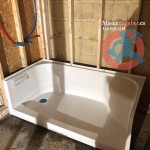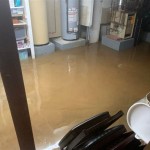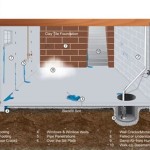Best Concrete Sealer For Basement Floors: A Comprehensive Guide
Basement floors, typically constructed of concrete, are susceptible to moisture intrusion, cracking, and staining. Selecting and applying the appropriate concrete sealer is essential for protecting the integrity and longevity of these surfaces. This article will explore the key considerations for choosing the best concrete sealer for basement floors, outlining various types, application techniques, and factors influencing performance.
Unsealed concrete is porous, meaning it readily absorbs liquids. In a basement environment, this can lead to several problems. Water can seep through the concrete from the surrounding soil, contributing to humidity and potentially fostering mold and mildew growth. Additionally, spills from household chemicals, paints, or even everyday liquids like juice can penetrate the concrete, causing unsightly stains. Freeze-thaw cycles can also be particularly damaging to unsealed concrete, with water expanding as it freezes within the pores, leading to cracking and surface deterioration.
A concrete sealer acts as a barrier, preventing moisture from penetrating the surface and protecting against staining and damage. Selecting the right sealer depends on several factors, including the existing condition of the concrete, the intended use of the basement space, and the desired aesthetic appearance. The following sections will delve into these considerations and provide guidance on making an informed decision.
Understanding the Types of Concrete Sealers
Concrete sealers are broadly categorized into two main types: penetrating sealers and topical sealers. Each type offers different protective mechanisms and possesses distinct advantages and disadvantages. Choosing the appropriate type is critical for achieving the desired performance and longevity.
Penetrating Sealers: These sealers work by penetrating the surface of the concrete and chemically reacting with the cementitious material. This reaction creates a hydrophobic barrier within the concrete itself, repelling water and preventing it from being absorbed. Penetrating sealers do not form a film on the surface, so they do not alter the appearance of the concrete or affect its breathability. They are typically more durable than topical sealers, as they are not susceptible to wear and tear from abrasion or UV exposure.
Silanes, siloxanes, and silicates are common types of penetrating sealers used for basement floors. Silanes are particularly effective at repelling water and are often used in areas prone to heavy moisture. Siloxanes offer good water repellency and are generally less expensive than silanes. Silicates react with the concrete to form a hard, durable surface that is resistant to abrasion and dusting. Penetrating sealers are an excellent choice for basements where moisture control is the primary concern and where a natural, unaltered appearance is desired.
Topical Sealers: These sealers form a protective film on the surface of the concrete, creating a barrier against water, chemicals, and abrasion. Topical sealers can enhance the appearance of the concrete, providing a glossy or matte finish and potentially adding color. However, they are typically less durable than penetrating sealers, as the film can be scratched, worn away, or damaged by UV exposure. They can also reduce the concrete's breathability, which may be a concern in basements with high moisture levels.
Acrylics, epoxies, and polyurethanes are common types of topical sealers used for basement floors. Acrylic sealers are relatively inexpensive and easy to apply, but they are less durable than other options. Epoxy sealers provide excellent chemical resistance and are often used in garages or workshops where spills are common. Polyurethane sealers are highly durable and resistant to abrasion and UV exposure, making them a good choice for high-traffic areas. When considering topical sealers, it’s crucial to properly prepare the concrete surface, ensuring it’s clean and free of any contaminants that could interfere with adhesion. Furthermore, selecting a breathable topical sealer, if moisture is a persistent issue, is a recommended measure.
Factors to Consider When Choosing a Concrete Sealer
Beyond the broad categories of penetrating and topical sealers, several factors influence the selection of the best concrete sealer for a specific basement floor application. These factors include the existing condition of the concrete, the intended use of the space, the desired appearance, and budget constraints.
Condition of the Concrete: Before applying any sealer, it's crucial to assess the condition of the concrete. Cracks, stains, or existing coatings can affect the sealer's performance. Cracks should be repaired before sealing, using a concrete patching compound. Stains should be cleaned thoroughly, and existing coatings should be removed to ensure proper adhesion. A porous concrete surface will generally benefit more from a penetrating sealer, allowing it to deeply penetrate and provide maximum protection. On the other hand, if the concrete is already in relatively good condition and aesthetics are a high priority, a topical sealer might be the preferred choice.
Intended Use of the Space: The intended use of the basement space will also influence the choice of sealer. A basement used as a living area will require a different sealer than a basement used for storage or as a workshop. For living areas, moisture control and stain resistance are paramount concerns. For workshops or storage areas, chemical resistance and abrasion resistance may be more important. High-traffic areas will require a more durable sealer that can withstand wear and tear. If the basement is prone to flooding, a penetrating sealer that allows the concrete to breathe may be the best option.
Desired Appearance: Concrete sealers can significantly alter the appearance of the concrete. Penetrating sealers typically do not change the appearance, while topical sealers can add a glossy or matte finish and potentially add color. Consider the desired aesthetic appearance when selecting a sealer. If you want to maintain the natural look of the concrete, a penetrating sealer is the best choice. If you want to add color or a glossy finish, a topical sealer is more appropriate. Some topical sealers are available in a variety of colors and finishes, allowing you to customize the look of your basement floor.
Application Techniques and Best Practices
Proper application is crucial for achieving the desired performance and longevity of any concrete sealer. Regardless of the type of sealer chosen, thorough surface preparation and careful adherence to the manufacturer's instructions are essential. This section outlines some best practices for applying concrete sealers to basement floors.
Surface Preparation: The first step in applying any concrete sealer is to prepare the surface properly. This involves cleaning the concrete thoroughly to remove any dirt, dust, grease, or existing coatings. A pressure washer can be used to remove loose debris and dirt. Stubborn stains may require the use of a concrete cleaner or degreaser. Existing coatings should be removed using a concrete grinder or chemical stripper. After cleaning, the concrete should be allowed to dry completely before applying the sealer. It's essential to ensure the surface is free of any contaminants that could interfere with the sealer's adhesion.
Application Methods: Concrete sealers can be applied using a variety of methods, including a brush, roller, or sprayer. The best method depends on the type of sealer and the desired finish. For penetrating sealers, a sprayer is often the most efficient method, ensuring even coverage. For topical sealers, a roller or brush may be preferred to achieve a smooth, uniform finish. Always follow the manufacturer's instructions regarding the recommended application method and the number of coats required.
Environmental Conditions: Environmental conditions can significantly affect the application and curing of concrete sealers. Avoid applying sealers in direct sunlight or during periods of high humidity or rain. The ideal temperature for applying most concrete sealers is between 50°F and 80°F. Ensure adequate ventilation during application to avoid the buildup of fumes. Allow the sealer to cure completely before exposing the floor to traffic or moisture. The curing time will vary depending on the type of sealer and the environmental conditions.
Safety Precautions: When working with concrete sealers, it’s crucial to take appropriate safety precautions. Always wear gloves, eye protection, and a respirator to protect yourself from harmful chemicals and fumes. Work in a well-ventilated area to avoid breathing in fumes. Follow the manufacturer's instructions regarding safety precautions and disposal of materials. Store sealers in a safe place, away from children and pets.
Choosing the best concrete sealer for basement floors requires careful consideration of various factors, including the type of sealer, the condition of the concrete, the intended use of the space, and the desired appearance. By understanding the different types of sealers available and following best practices for application, homeowners can protect their basement floors from moisture damage, staining, and deterioration, ensuring a durable and aesthetically pleasing surface for years to come.

Alternative Finishes For Interior Concrete Floors Decor

Colored Concrete Sealer How To Guide

Radonseal Plus 5 Gal Deep Penetrating Concrete Sealer For Foundations And Basement Floors 110 The Home

Clear Concrete Sealer How To Choose The Best Type For Your Project

What To Know About Waterproofing A Concrete Basement Floor

How To Choose The Best Garage Floor Sealer All Floors

Radonseal Plus 5 Gal Deep Penetrating Concrete Sealer For Foundations And Basement Floors 110 The Home

How To Choose The Best Garage Floor Sealer All Floors

Concrete Sealer How To Choose The Right For Your

The Best Rated Garage Coatings 2024
Related Posts







